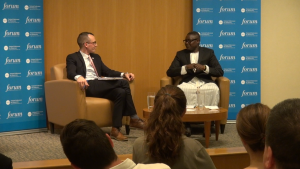WASHINGTON — The human rights campaign for homosexuals in Uganda has been getting a global spotlight since the notorious Anti-Homosexuality Bill was introduced in 2009, which imposed the death penalty on citizens on the basis of their sexual orientation.
While the international human rights community is passionate about “liberating” LGBTQ people in Uganda, those efforts might be “disempowering,” a Ugandan representative of Sexual Minorities Uganda said in a panel discussion April 30 at the National Endowment for Democracy.
“I know the movement and liberty here makes our partners in the West want to act, but sometimes that is not necessary,” said Pepe Julian Onziema, a Reagan-Fascell Democracy fellow with the NED, a nonprofit foundation that gets funding from the U.S. Congress to strengthen democratic institutions around the world.

Wade McMullen of Robert F. Kennedy Center for Justice & Human Rights and Pepe Julian Onziema of Sexual Minorities Uganda discuss homosexual rights in Uganda on April 30 at the National Endowment for Democracy in Washington. (Andersen Xia/Medill)
The Anti-Homosexuality Bill of 2009 put Uganda on a collision course with Western nations by also threatening to fine or imprison national and international activists and organizations that worked for the defense and promotion of LGBT rights in Uganda.
A revised bill was promulgated in February 2014 with a punishment of life in prison instead of the death penalty.
“It was actually curtailing fundamental freedoms, and cutting off access to critical services to LGBT community,” said Wade McMullen of Robert F. Kennedy Center for Justice and Human Rights in the discussion. “It went so much further than any other entire LGBT laws we’ve seen outside of Russia at that time.”
As one of Uganda’s biggest donors of foreign aid, the U.S. announced several sanctions in response, including cutting funding, blocking certain Ugandan officials from entering the country, while also supporting Ugandan LGBT nongovernmental organizations.
The punitive bill was nullified five months later.
Onziema said he appreciated the help from the international partners, but he was worried that outsiders might oversimplify the issue.
Onziema’s concerns are understandable. According to a New York Times story, the anger against same-sex relationship in Uganda that led to the introduction of the “Kill the Gays Bill” was stoked by three American evangelical Christians who delivered a series of homophobic speeches to thousands of Ugandans, including policy makers, in 2009.
They later defended their statements, saying they had never expected the legislation could be so harsh. According to the story, Rev. Kapya Kaoma, a Zambian who went undercover for six months to chronicle the relationship between the African anti-homosexual movement and American evangelicals, said that the three Americans “underestimated the homophobia in Uganda.” He said when someone speaks about a certain group trying to destroy their children and their families, “Africans will fight to death.”
Similarly, the international outcry and involvement, even though it supports the LGBT rights in Uganda, can be somehow counterproductive. While signing the revised bill of 2014, Ugandan President Museveni accused the U.S. of trying to impose its values on Ugandans by defending homosexual rights.
A spokesman said at the time that Museveni wanted to sign the bill “with the full witness of the international media to demonstrate Uganda’s independence in the face of Western pressure and provocation.”
While Onziema said the law was part of the Ugandan government’s process of stifling dissent by “pushing voices down,” he thought foreign countries should play the role of consultants instead of “doing things” for them.
Onziema said a clear set of rules as to how foreign governments and nonprofits can help Uganda without meddling was needed. “Being in the same page, consulting constantly with partners on the ground, on what it’s needed and how that help is given is very, very key,” he said.
Onziema said Uganda was making progress on the issue by citing the example of a resolution that was passed last year by African Commission on Human and Peoples’ Rights to eliminate violence against homosexuals. He said further promotion of LGBT rights in Uganda should depend on education and more profound, formal reforms.
“We are aware of where we come from and what [problems] are existing,” Onziema said.





